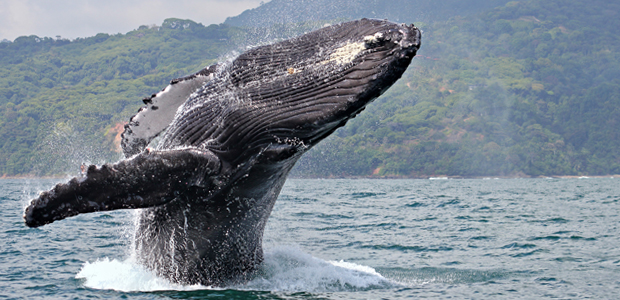Advertisement
Wildlife Wednesday: Humpback Whale
This Wildlife Wednesday, we’re talking humpback whales. These magnificent mammals have become the subject of controversy in Canada, as the government recently downgraded their level of protection under the Species at Risk Act (SARA). Habitat Humpback whales inhabit all the world’s oceans. Trivia Humpback whales are about the same size as a bus. Males produce … Continued

This Wildlife Wednesday, we’re talking humpback whales. These magnificent mammals have become the subject of controversy in Canada, as the government recently downgraded their level of protection under the Species at Risk Act (SARA).
Habitat
Humpback whales inhabit all the world’s oceans.
Trivia
- Humpback whales are about the same size as a bus.
- Males produce sonorous songs that are made up of moans, howls, cries, and other complex sounds. Researchers theorize that these songs could be a form of communication or a way to attract mates.
- Mothers and calves tend to swim side by side, sometimes brushing each other with their fins as a too-cute sign of affection.
- Like humans, whales age gradually. Calves continue to grow until they’re 10 years old.
- Humpback whales migrate farther than any other mammal. Their annual journeys take them thousands of kilometres, from polar regions to the tropics.
- They can weigh up to 80,000 pounds (36,287 kg).
- Despite their size, humpback whales are known for their acrobatic leaping displays. When breaching, for example, whales may launch themselves entirely out of the water.
Why are they threatened?
Not surprisingly, the whaling industry has been the greatest historical threat to humpback whales. More than 100,000 whales are estimated to have been slaughtered between 1900 and 1940—and that’s just in the southern hemisphere. Although whales are now protected from whaling, they still have to contend with habitat changes, pollution, and shifts in prey levels due to climate change.
To the dismay of conservationists, the Canadian government recently downgraded humpback whales from “threatened” to “a species of special concern” under SARA. This hotly contested decision means that neither the whales nor their critical habitat will be legally protected by SARA prohibitions. Critics of the downgrade also point out that the Northern Gateway pipeline may spell future trouble for these endearing animals, as the project could lead to more noise, oil spills, and collisions with whales.





